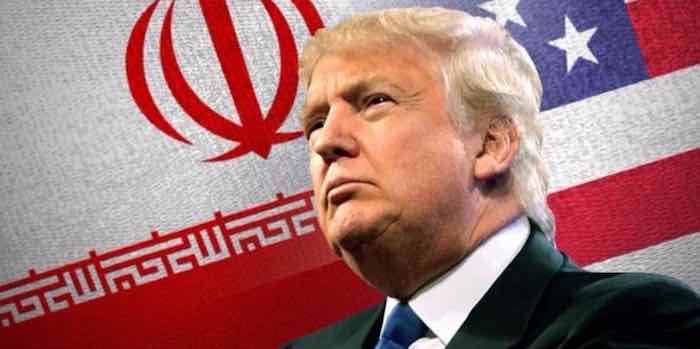President Trump may be maneuvering towards a position that uses the threat of restoring sanctions, and imposing new secondary sanctions on firms doing business with certain individuals and entities in Iran
President Trump Eyeing Major Changes to Disastrous Nuclear Deal with Iran
 By Joseph A. Klein —— Bio and Archives September 22, 2017
By Joseph A. Klein —— Bio and Archives September 22, 20171 Comments | Print Friendly | Subscribe | Email Us

Iran’s President Hassan Rouhani closed the door on re-opening the JCPOA for negotiations during his own address to the General Assembly and in his remarks afterwards to the press. “It will be a great pity if this agreement would be destroyed by rogue newcomers to the world of politics,” he said in a veiled reference to President Trump. He later told reporters that there could be no amending, reopening or renegotiation of the JCPOA as far as Iran was concerned.
With a straight face, President Rouhani claimed his regime never threatens anyone. He did not bother to explain how the missile launched by Iran last year with the Hebrew inscription, “Israel should be wiped off the Earth,” is something other than a threat. He also sidestepped Iran’s Supreme Leader Ayatollah Ali Khamenei’s threat in 2001: “It is the mission of the Islamic Republic of Iran to erase Israel from the map of the region.” And President Rouhani conveniently ignored the fact that, just days before his General Assembly speech, Iran’s army chief threatened Israel with destruction. “We will destroy the Zionist entity at lightning speed,” the army chief admonished Israel. “I warn the [Zionist] entity not to make any stupid move against the Islamic Republic of Iran. Every [such] stupid act will [make us] turn Tel Aviv and Haifa into dust.”
It is in this context that Israeli Prime Minister Benjamin Netanyahu explained in his speech to the General Assembly, delivered on the same day that President Trump had spoken, why he has continued to raise alarms about the JCPOA. “President Trump rightly called the nuclear deal… an embarrassment,” the prime minister said. “Well, I couldn’t agree with him more. And here’s why: Iran vows to destroy my country every day, including by its chief of staff the other day. Iran is conducting a campaign of conquest across the Middle East and Iran is developing ballistic missiles to threaten the entire world.”
The first is the so-called sunset provision, setting expiration dates from 10 to 15 years on the loophole ridden restrictions the JCPOA imposes on Iran’s nuclear program. As Prime Minister Netanyahu explained in his General Assembly speech, the sunset clause means that the JCPOA “restrictions will be automatically removed — not by a change in Iran’s behavior, not by a lessening of its terror or its aggression. They’ll just be removed by a mere change in the calendar.” The prime minister added that “when that sunset comes, a dark shadow will be cast over the entire Middle East and the world, because Iran will then be free to enrich uranium on an industrial scale, placing it on the threshold of a massive arsenal of nuclear weapons.” In short, we will be facing a reprise of the clear and present danger created by nuclear-armed North Korea, which previous agreements with that rogue state failed to prevent. Thus, President Trump sees it as a top priority to change the JCPOA’s dangerous sunset provision.
Second, Obama made a major last minute concession by agreeing not to include an unambiguous legal ban in the JCOPA on Iran’s development and testing of ballistic missiles capable of delivering nuclear weapons. Instead, with former Secretary of State John Kerry leading the negotiations, the Obama administration and its negotiating partners – the United Kingdom, France, the European Union, Russia, China and Germany – went along with swapping an unambiguous missile ban that was a cornerstone of previous UN Security Council resolutions for a wishy washy new Security Council resolution endorsing the JCPOA. Security Council Resolution 2231 no longer imposes legally binding restrictions on Iran’s own ballistic missile activity. Instead Iran is merely “called upon” to refrain from such missile-related activities for up to eight years from the date the JCPOA was formally adopted. Politely calling upon Iran to do something does not amount to a legally binding prohibition. Iran has tested several ballistic missiles, claiming correctly that such activities do not violate the literal terms of the JCPOA. President Trump wants to fix this glaring deficiency.
Third, the inspection system put into place to verify Iran’s compliance with its JCPOA commitments is woefully inadequate. The International Atomic Energy Agency (IAEA), which is the international body charged with monitoring Iran’s compliance, must be able to inspect “anytime, anywhere” it suspects a possible violation, including at military sites. Currently, that is not the case. Iran can place certain sites off-limits or conduct its own self-inspections. That’s like placing the arsonist in charge of putting out the fire he sets.
Continued below...
Despite the JCPOA’s obvious grave shortcomings, the U.S.’s Western European negotiating partners appear unwilling to open it up for re-negotiation. Heaven forbid that they might rile the Iranian regime’s feathers and lose the prospect of billions of dollars in trade with the rogue regime.
Federica Mogherini, the foreign affairs minister for the European Commission, spoke to reporters at UN headquarters following a closed door meeting that included U.S. Secretary of State Rex Tillerson, Russian Foreign Minister Sergey Lavrov, Chinese Foreign Minister Wang Yi, Iranian Foreign Minister Javad Zarif, and diplomats from Britain, France and Germany as well as the United States’ UN Ambassador Nikki Haley. Ms. Mogherini said that the idea of seeking to change the JCPOA or the Security Council resolution endorsing it did not come up for serious discussion in the meeting since the JCPOA was “fully delivering.” She added that “the international community cannot afford dismantling an agreement that is working and delivering.”
Given its fundamental flaws, the international community cannot afford sticking with this nuclear agreement as is. Simply kicking the can down the road will set the world up for another North Korea style existential threat in little more than a decade. Prime Minister Netanyahu had it right when he said in his General Assembly speech that “the greater danger is not that Iran will rush to a single bomb by breaking the deal, but that Iran will be able to build many bombs by keeping the deal.”
While Ms. Mogherini was correct in saying that the JCPOA is not just a “bilateral agreement,” it was essentially the product of bilateral negotiations between Zarif, Kerry and their respective teams. If Iran so far has not violated its specific binding JCPOA commitments, it is only because Obama and Kerry recklessly permitted the JCPOA’s terms to be so tilted in Iran’s favor. What was done in this case can and must be undone.
Despite the JCPOA’s obvious grave shortcomings, the U.S.’s Western European negotiating partners appear unwilling to open it up for re-negotiation. Heaven forbid that they might rile the Iranian regime’s feathers and lose the prospect of billions of dollars in trade with the rogue regime.
Federica Mogherini, the foreign affairs minister for the European Commission, spoke to reporters at UN headquarters following a closed door meeting that included U.S. Secretary of State Rex Tillerson, Russian Foreign Minister Sergey Lavrov, Chinese Foreign Minister Wang Yi, Iranian Foreign Minister Javad Zarif, and diplomats from Britain, France and Germany as well as the United States’ UN Ambassador Nikki Haley. Ms. Mogherini said that the idea of seeking to change the JCPOA or the Security Council resolution endorsing it did not come up for serious discussion in the meeting since the JCPOA was “fully delivering.” She added that “the international community cannot afford dismantling an agreement that is working and delivering.”
Given its fundamental flaws, the international community cannot afford sticking with this nuclear agreement as is. Simply kicking the can down the road will set the world up for another North Korea style existential threat in little more than a decade. Prime Minister Netanyahu had it right when he said in his General Assembly speech that “the greater danger is not that Iran will rush to a single bomb by breaking the deal, but that Iran will be able to build many bombs by keeping the deal.”
While Ms. Mogherini was correct in saying that the JCPOA is not just a “bilateral agreement,” it was essentially the product of bilateral negotiations between Zarif, Kerry and their respective teams. If Iran so far has not violated its specific binding JCPOA commitments, it is only because Obama and Kerry recklessly permitted the JCPOA’s terms to be so tilted in Iran’s favor. What was done in this case can and must be undone.
Russia and China have their own geopolitical and economic reasons for not wanting to see the JCPOA altered. However, their opposition to any changes can be overcome if America’s Western European negotiating partners stand united in placing significant economic pressure on Iran if it refuses to reopen negotiations, particularly on the sunset and ballistic missile issues. Nevertheless, Western European countries appear all too willing to sacrifice long term international security for a feel-good short term moratorium on Iran’s nuclear enrichment program and for the pot of gold that Iran is dangling.
The European Union came in third after China and India as one of Iran’s top trading partners in goods in 2016. The EU’s exports of goods to Iran grew by 27.8 percent in 2016. Machinery and transport equipment accounted for 46.2 percent of such exports, some of which may well be dual-use.
France’s energy company Total signed a $5 billion contract with Iran last July. And this may only be the tip of the iceberg.
If money filling these countries’ coffers is the only thing these countries understand, then the Trump administration may have to force them to make a choice between continuing to do business as usual with the United States or going after business with Iranian individuals and entities on the U.S.’s most updated sanctions list.
As President Trump said, “When decent people and nations become bystanders to history, the forces of destruction only gather power and strength.” We cannot allow Iran to become another North Korea.
No comments:
Post a Comment